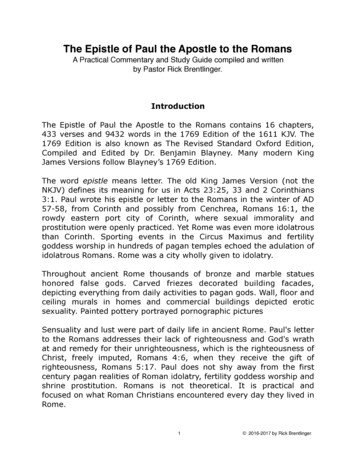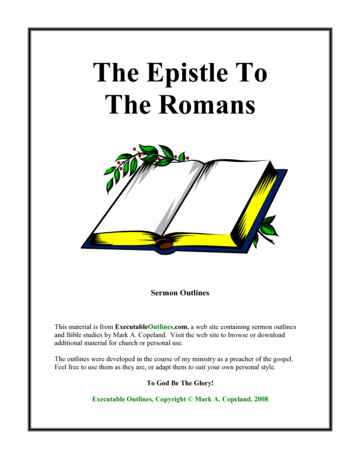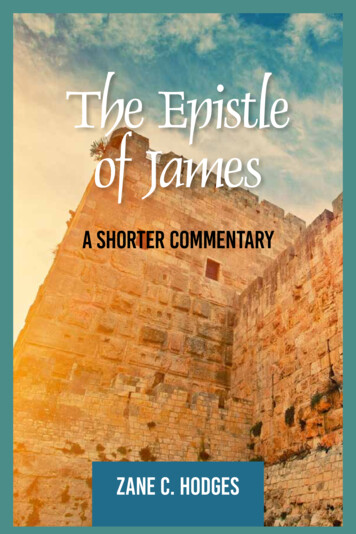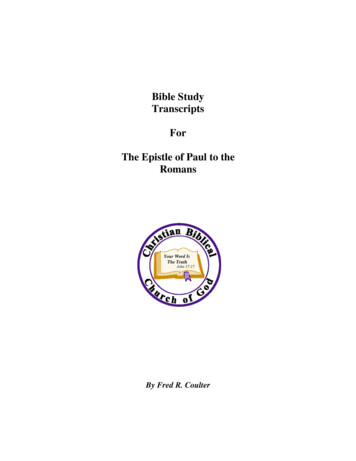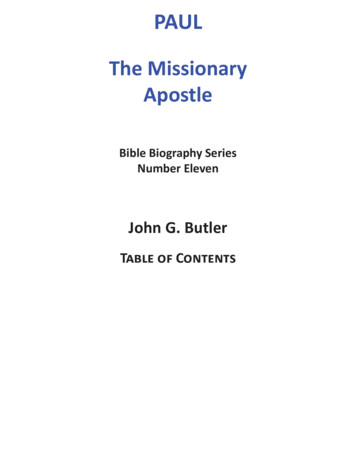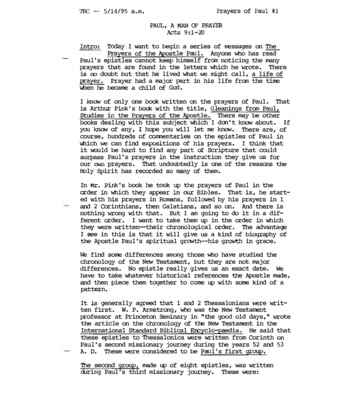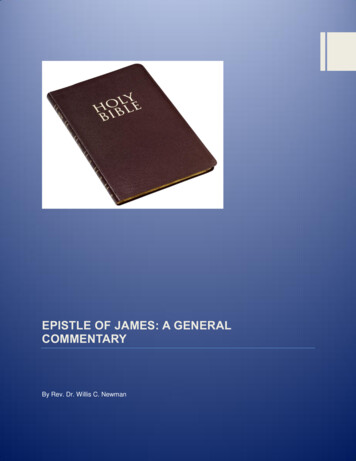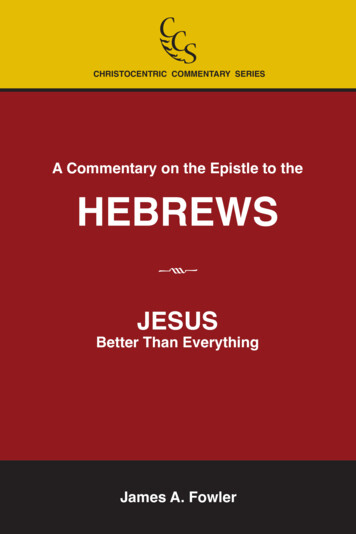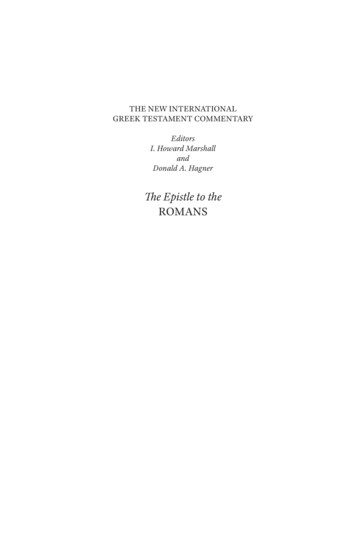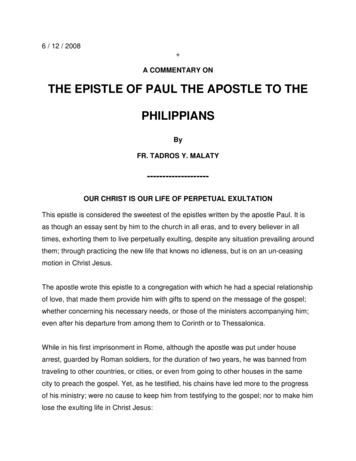
Transcription
6 / 12 / 2008 A COMMENTARY ONTHE EPISTLE OF PAUL THE APOSTLE TO THEPHILIPPIANSByFR. TADROS Y. MALATY-------------------OUR CHRIST IS OUR LIFE OF PERPETUAL EXULTATIONThis epistle is considered the sweetest of the epistles written by the apostle Paul. It isas though an essay sent by him to the church in all eras, and to every believer in alltimes, exhorting them to live perpetually exulting, despite any situation prevailing aroundthem; through practicing the new life that knows no idleness, but is on an un-ceasingmotion in Christ Jesus.The apostle wrote this epistle to a congregation with which he had a special relationshipof love, that made them provide him with gifts to spend on the message of the gospel;whether concerning his necessary needs, or those of the ministers accompanying him;even after his departure from among them to Corinth or to Thessalonica.While in his first imprisonment in Rome, although the apostle was put under housearrest, guarded by Roman soldiers, for the duration of two years, he was banned fromtraveling to other countries, or cities, or even from going to other houses in the samecity to preach the gospel. Yet, as he testified, his chains have led more to the progressof his ministry; were no cause to keep him from testifying to the gospel; nor to make himlose the exulting life in Christ Jesus:
(1) The apostle Paul found in his prison a chance to talk to the Roman guards andofficials about our Lord Jesus, a unique chance to preach,which he could not let go. Realizing that he was imprisoned for the sake of the LordChrist and His gospel, the guards got interested toknow more about both; which led some of them to believe.The word of God is so strong and capable to transform the hosts of evil of this worldof darkness, to confess the greatness of God, and to reveal His exalted work; as ithappened when God used the Pharaoh of Egypt, during the Exodus of the childrenof Israel; Herod, at the time of birth of the Lord Christ; those who mocked andscoffed the Lord during His crucifixion; and the guards on His tomb;(2) The imprisonment provided the apostle Paul with the chance to write to the peoplebeloved by him, about the perpetual life exulted in theLord.(3) Contrary to those who preached out of envy and ulterior motives, there were others,as well, who preached with faithfulness, love, andholy will. The apostle’s friends, disciples, and a multitude of believers, becamestronger in faith, and more daring in preaching without fear,to partake of the apostle’s honor as a captive of the Lord Christ.(4) His enemies worked hard to draw many heathens to faith, with the purpose ofstirring up the emperor and the rulers against Paul, and tokeep them from setting him free. Some others used the imprisonment of the apostlePaul to appear as though more diligent in preaching the gospel; with the assumptionthat by so doing, they would belittle his status. Anyway, even those who preachedout of envy, in order to add more sorrow to the apostle, made him, on the contrarymore exulted for the sake of the growth of the ministry of Lord Christ and the gospel(1: 16-18).
AN INTRODUCTION TO THE EPISTLETHE CITY OF PHILIPPI:The name ‘Philippi’ means (a lover of horses or of war). It was considered the mostimportant city in the whole region, on account of that it is the first city reached by a seatraveler to Macedonia.(1) Geographically: Originally known as ‘Krenides’, meaning (wells or springs), it wasgiven the name ‘Philippi’ after king Philip, the second ofMacedonia, father of Alexander the Great. But after the Romans took it over, itbecame a part of Macedonia.It is located North-east of Macedonia, north of Greece, nine miles away from theAegean Sea, on a prominent little hill, surrounded by afertile valley, that made it an agricultural province, beside having mines of gold andsilver nearby.(2) Historically: In the year 357 B. C. king Philip the second of Macedonia took overthe province of ‘Krenides’ up to the River ‘Nestos’,annexed it it his kingdom; made the city larger by adding more lands to it, andstronger to face any attack by enemies. Yet, it eventually fell under the authority ofthe Romans, to become a Roman colony instead. And when Octavius becameemperor on the Roman empire, and changed his name to ‘August Caesar’, he gavespecial care to the city of ‘Philippi’, renewed it, made it even larger, and granted itthe ‘colonial status’, namely, a free Roman colony, whose inhabitants had the samerights and privileges enjoyed by the inhabitants of Rome, the capital. It started tohave a Roman culture more than a Greek one, and adopted the Latin language asits official language. The prevailing religion was idol worship.
PREACHING IN PHILIPPI:In the year 50 or 51 A.D. “a vision appeared to the apostle Paul in the night; a man ofMacedonia stood and pleaded with him, saying: ‘Come over to Macedonia and help us’.Now after he had seen the vision, he immediately sought to go Macedonia , concludingthat the lord had called him to preach the gospel to them” (Acts 16: 9, 10). Accompaniedby Silas, Luke the Evangelist, and Timothy, they went to Philippi, the foremost city in theprovince of Macedonia, in which Paul took notice of the following points: Paul was a Jew, while the Philippians were Gentiles. Paul was proud of his Jewish origin, while the Philippians were proud of beingRomans; although Paul himself had the Roman citizenship. Paul was Asian, while the Philippians were Europeans. Paul’s mother tongue was Hebrew, and he mastered the Greek language, whilethe Philippians spoke both Latin and Greek. Paul’s heart radiated the faith in Christ, while the Philippians lived in heathenabominations.The apostle Paul visited ‘Philippi’ (Acts 16: 11-40) during his second preaching trip, andthere, he established the first Christian church in Europe. Once he arrived there,accompanied by Silas, Luke, and Timothy, they went to the suburbs of the city on theriverside of the River ‘Gengets’, where the Jews used to pray every Sabbath day, andspoke to the women about salvation. Now a certain woman named ‘Lydia’, a rich sellerof purple heard the testimony of the apostles, the Lord opened her heart to faith, andshe, together with her household, were baptized, and begged and (constrained) theapostle and his company to come and stay in her house. She became the first Christianin all Europe; and Philippi became the first city in Europe to believe in the Christian faith(See Acts 16: 12, 15, 40).St. Luke the Evangelist, in the book of acts (16: 16-40), wrote about how an evil spirit ofdivination was driven out of certain slave girl, who brought her masters much profit by
fortune-telling. That girl followed Paul and his company, crying out, saying: “These menare the servants of the Most High God, who proclaim to us the way of salvation”. Doingthat for many days, Paul, greatly annoyed, turned and said to the evil spirit: “I commandyou in the name of Jesus Christ to come out of her”, which he instantly did (Acts 16: 1618). Yet, our teacher Paul did not accept that testimony from the devil, the enemy of theTruth; because if he did, all the people present would have accepted all her words. Butwhen her masters saw that their hope of profit was gone, they seized Paul and Silas,dragged, and brought them to the magistrates, and said: “These men, being Jews,exceedingly trouble our city, and they teach customs which are not lawful for us, beingRomans, to receive or to observe”. The magistrates tore all their clothes, andcommanded them to be beaten with rods. In this incident, we can notice the following: The charge against them is not new; the devil used it on the tongues of the Jewsagainst the Lord Christ Himself. God, who allows evil and anguish to dwell upon His children, turns evil to good,and anguish into comfort; by which His believers could see His wonders, andexperience His love and work in them. Having their clothes torn, Paul and Silas rejoiced because they had before theireyes Jesus Christ bared on the cross to cover our nakedness. That sacrifice done by the two apostles represents the cross of preaching, thecost of the distribution of the gospel, and the salvation of souls from the hold ofthe devil. It was an opportunity for ‘Saul of Tarsus’ to remember what he has previouslydone to the innocent Christians of persecution, beating, murder, andimprisonment; “I will show him how many things he must suffer for My name’ssake” (Acts 9: 16).Despite their suffering of imprisonment, injustice, and persecution, Paul and Silas, atmidnight, were praying and singing hymns to God; and the prisoners were listening tothem. Suddenly there was a great earthquake, so that the foundations of the prisonwere shaken, and immediately all the doors were opened, and everyone’s chains were
loosed. But Paul and Silas did not escape. Such an earthquake and other laterwonders, like the movement of the Mokattam mountain, near Cairo, reveal the limitlessstrength of the Christian faith that surpasses time, and would never get old.The keeper of the prison, awaking from sleep and seeing the prison doors open,assuming that the prisoners had fled, drew his sword and was about to kill himself. ButPaul called with a loud voice, saying: ‘Do yourself no harm for we are all here’. At thatthe prison keeper fell down trembling before Paul and Silas. They spoke the word of theLord to him and to his household, who all received the Christian faith. The next day,when the magistrates heard that Paul and Silas were Roman citizens, they wereembarrassed because they have beaten and imprisoned them without trial.In short, the apostle Paul afterwards visited Philippi twice during his third preaching tripin about the years 57 and 58 A.D. (Acts 20: 1, 6). Later, when the Philippians heardabout his imprisonment in Rome in the years 61-62 A.D, they sent ‘Epaphroditus’ to himwith a gift (4: 10), and to stay to serve him. The Philippians were immensely distressedto hear that Epaphroditus’ fell sick almost unto death; and when he got well, Paul senthim back to the Philippians to rejoice, having been longing to see him.SOME INFORMATION ABOUT THE CHURCH IN PHILIPPI:1- Because of the small number of Jews in Philippi, bigotry was less felt than in othercities.2- This church had a special place in Paul’s heart, because he went there according toa heavenly vision.3- Feeling a great love for the apostle Paul, the Philippians sent to him material supportmore than once.4- It was a suffering church, scoffed by adversaries, on account of that they worshippedsomeone condemned to death.5- This church represented home where Paul found comfort.
THE DATE OF WRITING THIS EPISTLE:This epistle, together with those to the Ephesians, to the Colossians, and to Philemon,were known as the ‘captivity epistles’, written while Paul was in his first captivity, or inprison in Rome (61-63). This epistle was the last of them, and Paul sent it with‘Epaphroditus’.THE GOAL OF SENDING THIS EPISTLE:The goal of writing this epistle as proclaimed by the divine inspiration, was to supportthe children of God before the afflictions of this world. It demonstrates to us a portrait ofthe believer as a saint, who, despite suffering bitter situations, yet he is always rejoicingin the Lord; and that the world cannot deprive us of the comfort in Jesus Christ, or ofexperiencing the spiritual victory over all the disturbing circumstances. This epistle,indeed, shows us how our behavior in this world, our relationship with one another, andwith the others should be:1-The Philippians worried about their beloved prisoner in Rome.2- They worried about the preaching of the gospel by the apostle to the Gentiles.3- This epistle was a call to rejoice in all circumstances; a call to fellowship in preachingthe gospel (1: 5); in the grace of Christ (1: 7); inthe Spirit of Christ (2: 1); in the passions of Christ (3: 10); in the afflictions for Christ’ssake (4: 14); and in giving (4: 15).4- He wrote to thank them for their generosity in giving.5- He wrote to counsel them and to warn them against the false teachers.6- There were no problems or dissensions worth mentioning; except some nonconformity between two women ministers in the church:‘Eudia’ and ‘Cyntyche’, that caused some concern by the apostle.FEATURES OF THIS EPISTLE:
1- There are no doctrine debates in this epistle; for the apostle’s mind was whollyabsorbed in the heavenly joy. What isproclaimed in this epistle, is the active (dynamic) heavenly life, exulted in our LordJesus Christ; as shown in the fellowship in the Lord (4:1). Joy is the main feature in the relationship of the apostle with the churchcongregation; it supports the believers to endure the suffering,and to confront the possibility of martyrdom.*We practice this joyful life here on this earth, as long as Christ is our life; and forus, to die is gain and a profit (1: 21); as we shall behold Christ face to face at ourdeparture from this world.*“Our desire is to depart and be with Christ, which is far better” (1: 23).*We strive toward “the prize of the upward call of God in Christ Jesus” (3: 14).*Although “Our citizenship is in heaven” (3: 20), yet St. Paul was not preoccupiedwith receiving the prize after death, but with preaching the gospel; and withturning his whole life into a glorification of the Lord Christ. If by his death he couldglorify Christ, it would be “gain’; as long as the goal of his whole life is to glorifyChrist.*We anticipate Jesus Christ who will change our weak bodies to the likeness ofHis glorified body. We honor our bodies, because they will partake of the gloriesof our souls.*The apostle Paul counts the joy and crown of his people as his own (4: 1). Thegood minister practices the life of fellowship with those he ministers. He rejoicestogether with them, and suffers when they confront troubles. And according to hiswords of the apostle Paul, he counts himself “labor in birth for them until Christ is
formed in them” (Galatians 4: 19); and in the world to come, he will find them hiscrown.*He counts his ministry as a call for joy: “Rejoice in the Lord always. Again I willsay, rejoice” 4: 1).*“He counts all things as rubbish, that he may gain Christ” (3: 8); being oursufficiency and our treasure.*The apostle repeats the expression: “the day of Jesus Christ” (1: 6, 10); as ajoyful day.2- The apostle Paul refers to the meaning of the incarnation and salvation (2: 6-11).3- The apostle proclaims his trust in the work of God: “I trust in the Lord that I myselfshall also come shortly” (2: 24). He has confidencethat the Lord will set him free of prison, and bring him back to them.4- The apostle trusted that God will work in the rulers of that country who wereextremely evil and corrupted.5- Through sanctifying our emotions, the apostle Paul does not only lift us up to see ourbodies glorified, and be in the likeness ofthe body of Jesus Christ risen from the dead; but he indirectly exhorts us not todestroy our emotions, but to enjoy sanctifying them;saying:“I have you in my heart” (1: 7).“How greatly I long for you all with the affection of Jesus Christ” (1: 8).“Since he (Epaphroditus) was longing for you all, and was distressed because youhad heard that he was sick. For indeed he was sick
almost unto death” (2: 26, 27).“Therefore, if there is any comfort of love, if any affection and mercy, fulfill myjoy by being like-minded, having the same lovebeing of one accord, of one mind” (2: 1, 2).6- The cooperation between the divine grace and the will of man; as it is God’spleasure to work in us; by strengthening and sanctifying ourwill, and supporting us to work, in case we submit to Him. He wishes for us to bepositive toward our salvation: “Work out your own salvation with fear and trembling;for it is God who works in you, both to will and to do for His good pleasure” (2: 1213). The apostle Paul also wishes for us not to cease striving: “for the prize for theupward call of God in Christ Jesus” (3: 14).7- The apostle Paul did not only diligently practice the joyful life in the Lord, but he alsobecame the source of joy for those suffering; being“poured out as a drink offering on the sacrifice and service of their faith” (2: 17-18).In the book of Exodus 29: 40, the drink offeringrefers to the joy through the suffering. Wine, as a symbol of the spiritual joy, ispoured on the sacrifice (the suffering), to turn it into aninner joy8- The apostle Paul refers to the importance of ‘delivery’ (4: 6); which we sometime call‘tradition’,9- The positive role of the congregation (the laic), whom he called ‘saints’, to whom hereferred even before the bishops and deacons (1:1). As the main topic of this epistle is life in Christ, reactive (dynamic) and exulting,namely, the heavenly holy life; that is why it is directed to the church as a whole, andparticularly to the congregation, called to be saints. It is is the commitment of thebishops and the deacons to do their best to minister to the children of God tobecome truly saints.
10- The apostle Paul lived his life interceding for others. Even while in prison he used topray for his friends, saying: “I thank God for everyremembrance of you, always in every prayer of mine making request for you all withjoy” (1: 3-4).THE AUTHENTICITY OF THE EPISTLE:It is established that this epistle is written by the apostle Paul, as confirmed by all theearly testimonials, like those of Saints Polycarp, Erinaos, Cyprian, and the scholarOrigen, and others; beside the fact that its style, teachings, and principles, all conformto the same in the other epistles written by the apostle Paul.DIVISIONS OF THE EPISTLE:1- Joy amid the sufferingsChapter 12- Joy in the ministryChapter 23- Joy in the LordChapter 34- Joy in everythingChapter 4---------------------------------AN INSPRATION FROM THE EPISTLE TO THE PHILIPPIANSYOU ARE MY JOY Heaven so glittered before the eyes of Paul the prisoner, that,He did not see the iron chains around his hands;But saw the splendor of Your glory reflecting on him.He did not even desire to hasten to go out to work to the account of Your gospel;
Because the chains have opened up new doors for preaching. The magistrate building turned in his eyes into a podium for the Word.And in his cell, he found a magnificent opportunity to write epistles to his beloved. His soul exulted in him, to offer a praise of thanksgiving.By his prison, the hearts of his beloved were encouraged to preach with more zeal.And even his adversaries found in it an opportunity to minister to spite him;With the assumption that they would by that, add affliction to his chains.And by that, they would steal his glory.But the heart of Paul, the gospel lover, was exulted.When he realized that all things led to the glory of God. His prison became a practical preaching by the life of joy in You.O Source of joy!O my joy and the exultation of my heart. CHAPTER 1JOY AMID THE SUFFERINGSSIGNS OF THE JOYFUL LIFE IN CHRIST:From his prison, the apostle Paul wrote to the church beloved by him, which had aspecial place in his heart. The topic of this epistle is ‘Christ our joy’; the Source of joy inall circumstances, that transfigures more amid the sufferings, by which we partake ofHis passions.
In this chapter, the apostle Paul presents to us certain signs of this new exulting life inChrist Jesus:1- A holy look at the others: The apostle calls the believers “All the saints in ChristJesus” (1); both congregation and priests.2- Holy emotions (7-8). When St. Augustine repented, his old emotions changed theircourse. Instead of the carnal desires, which weredestroying his energies, he enjoyed new divine desires, and his emotions wereenflamed by love for God and for men.3- Growth in love (9); in knowledge, in discernment (9); in good works (10); and inrighteousness (11). Joy is behind this perpetualgrowth and continuous progress in Christ Jesus; It is a daily renewal, aiming to belike the Lord, who is Love, Wisdom, andRighteousness.4- Directing all the energies to the salvation of man with joy (12-26). St. Paul wasnot brooding on his imprisonment or sufferings, but herather found in his prison a great opportunity to testify to Christ in a new atmosphere:among the prison guards and the state officials. He exulted in his imprisonment, for itgave a serious and daring push to the preaching of the gospel, both by himself, hisdisciples and friends, and even by his adversaries who envied and opposed him.5- Joy in the gift of suffering (27-30). Suffering for the sake of Christ was the apostle’sprogram which he often proclaimed in his epistlesSuffering carried to others a testimony of the transfiguration of the Lord Christ in us,as did the chains of the apostle Paul (7, 13). It can, as well, incite in us the growth infaith. It is a gift from the Lord Christ. Just like faith, joy in his suffering was atestimony that the apostle’s soul is free, having created an atmosphere of joy eveninside the prison. Telling us about his exulting conquest of the suffering because ofhis trust in Christ, he refers to the name of the Savior 40 times in this short epistle.
To enjoy the perpetual joy, it is befitting of the believer to re-evaluate his life; lestwhat came in Revelation 3: 1 would apply to him: “I know your works, that you havea name that you are alive, but you are dead”.1- An apostolic greeting1–22- Thankfulness, prayers, and love3–73- Longing and prayers8 – 114- Chains and conquest12 – 145- Rejoicing in preaching Christ15 – 196- Life in Christ20 – 267- A challenge and strength27 – 301- AN APOSTOLIC GREETING:“Paul and Timothy, servants of Jesus Christ, to all the saints in ChristJesus who are in Philippi, with thebishops and deacons” (1)Here, St. Paul adds the name of his disciple Timothy, as being a fellow partaker of hismission; He was planning on dispatching him to Philippi to bring back their news to him,to be comforted and rejoice (2: 19). Because Timothy was well known to them (acts 16:3, 10-12), and had a special place in their hearts, he accompanied Paul in his two visitsto Philippi. Paul wrote his name in the epistle, although he did not take part in writing it.“Paul and Timothy, servants ” Demonstrating true humility, the apostle Paul, althoughthe teacher and the author of the epistle, adds the name of his epistle to his name, asequals, without discrimination. Timothy, actually, represents the consistent discipleship,strife, and persistence to the last breath.St. Paul does not call himself as an apostle in this epistle, nor in that to theThessalonians, or to Timothy, because his apostleship was not in doubt by the
addressees; and the Philippians were not in need to be reminded of his apostolicauthority.The apostle calls himself and his disciple “servants of Jesus Christ); as they seek nospecial place in the church, and are not preoccupied with authority, but boasted thework of the Lord who gave them the blessing to be servants to fulfill His will. Theapostle, in this epistle calls himself a servant for the following reasons:1- He opens the epistle by what is fitting for such believers as the Philippians.2- Because he was going to talk about the Son of God who emptied Himself and tookthe form of a servant3- Paul, feeling that he is a possession of the Lord; having been bought by His preciousblood, he became His servant.4- The church in Philippi was the fruit of Paul’s obedience to the Lord. Calling himself a servant and not an apostle! How great indeed is this rank, and howit is the top of all goodness, to be a servant of Christ,and not just someone called for ministry. A servant (a slave) of Christ is actually free,as far as sin is concerned. And being a slave for someone, he could not be enslavedby another; namely, he could not share his service to Christ with some other master.(St. John Chrysostom) Who would not love to be chained by such chains like those of Paul; which, althoughreal chains, yet they are rather, chains of love thatbring forth liberty; hence boasted by those chained by them, like Paul and Timothy,who call themselves: “servants of Jesus Christ”. Beingso chained, and enslaved, we would become in a greater glory than to be free withsomeone else.(St. Ambrose)
“To all the saints in Christ Jesus” (1). The apostle often uses the term “all”, and “you all”(!: 4, 7, 8, 25; 2: 26), with the intention of exhorting us to keep away from divisions anddissentions. As the Jews, as well, had the tendency to call themselves “saints”, according to theearly inspiration (the Old Testament), in which they were called “a holy nation”(Exodus 19: 6); “a holy people to the lord your God” (Deuteronomy 7: 6, etc.). Theapostle Paul added the designation: “in Christ Jesus”; as those are alone, and notthe others, are the true saints,(St. John Chrysostom)We should marvel at his reference to the congregation, and calling them “all the saintsin Christ Jesus”, before referring to the bishops and the deacons.The term “bishops” came to mean (Presbyters), embracing the bishops and the prieststogether; as, according to St. John Chrysostom, Philippi was not large enough to havemore than one Presbyter. He also believes that the bishops count the priests and thedeacons as their fellow partners in ministry. St. John Chrysostom says that the apostleused to write his epistles to the church, with no reference to the clergy, except in thisepistle; on account of that they sent ‘Epaphroditus’ to him with a generous gift.“Grace to you and peace from God our Father and theLord Jesus Christ” (2)Grace is the free divine gift or blessing granted by God to man; And the divine peacesurpasses every mind and all imagination. The apostolic blessing in the majority ofcases used to present those two most exalted gifts: the divine grace and peace; notfrom the apostle himself, but from God the Father and the Lord Jesus Christ.
2- THANKFULNESS, PRAYERS, AND LOVE:“We give thanks to the God and Father of our Lord Jesus Christ,praying always for you” (3)The exulting inner nature of the apostle Paul, perpetually flows through presenting asacrifice of thanksgiving to God for His work, not only for his own sake, but for that ofhis ministered children. As a father, he counts every gift and every success of the people as though his own;and he always thanks God in the name of his people.(The scholar Origen)“Always in every prayer of mine making requests foryou all with joy” (4)The Philippians were always in the apostle’s mind and heart, even amid his chains, andhis preoccupation with the affairs of the other churches; Remembering them in the Lord,always incites in him a desire to pray for their sake with joy and exultation.The apostle binds thanksgiving with praying; He thanks God for their faith, love, andzeal in preaching. “Praying always for you”. Always caring for, and knowing the value ofprayers, Paul always raised his heart with prayers for the sake of the labors andproblems of those he ministered. He prayed with joy, despite being a political prisoner,who could be condemned to death. Christianity is the religion of the joyful and rejoicingheart, and of the shining and cheerful contention . The Christian is always rejoicing forhis faith, for His Christ, and happy for His Kingdom.The apostle did not refer to the sufferings that he, and his companion Silas haveconfronted in Philippi; when the magistrates tore their clothes, gave orders to beat them
with rods, and to cast them in the inner prison (Acts 22). But what he always rememberis God’s work with him in receiving faith, and the joy that God granted him amid hissufferings. Not because your progress in virtue, I would cease to pray for your sake!(St. John Chrysostom)“For your fellowship in the gospel from the firstday until now” (5)The apostle does not say that the secret of his joy, is that they received faith, andalways listened to the sermons, but “for their fellowship”; having translated their faithinto a fellowship of collective spiritual love. Since the first day he came to them, and upto this very moment, they believed and stuck to one another in a collective fellowship inthe Lord. It is not a temporary emotional reaction; but an exalted fellowship of love, thatprovoked them to persist on working together, to perpetually experience the joyfulevangelic church life.“Your fellowship in the gospel”: is a practice of mutual evangelic love, between all ofthem: congregation, and clergy; a fellowship in worship (in the Liturgy and theEucharist); a fellowship in the material things, a desire of perpetual giving (2 Corinthians9: 13; Galatians 6: 6; Hebrew 13: 16); and a fellowship in the testimony of the gospel ofChrist, all of which are realized by the fellowship of the Holy Spirit (2 Corinthians 13:14).When we live in Christian love, this is considered as a practical preaching of the gospel.When we pray for the sake of one another, this is considered a preaching of the gospel;And when we seek the divine help for the sake of the preachers, this is considered apreaching of the gospel. All that was done by the Philippians. The principle here isobvious: that everyone who labors in the gospel, will certainly partake of the grace.
If the “fellowship” is to be given to us with “the Father, the Son, and the Holy Spirit”,it would be fitting of us to be aware lest we bring theholy divine fellowship to no avail through committing sin; For if we do the works ofthe darkness (Romans 13: 12), it would be obvious thatwe deny the fellowship of the light.(The scholar Origen) When we serve someone who preaches, we shall share his crowns with him. In thewrestling arena, it is not only the winner who takes thecrown, but it will be shared by those who are in his corner, like the coach, the trainer,and even his fans . If we serve the saints with pure conscience and heart, we willpartake of their reward; according to the words of the Savior Himself who says:“Make friends for
THE EPISTLE OF PAUL THE APOSTLE TO THE PHILIPPIANS By FR. TADROS Y. MALATY ----- OUR CHRIST IS OUR LIFE OF PERPETUAL EXULTATION This epistle is considered the sweetest of the epistles written by the apostle Paul. It is as though an essay sent by hi
